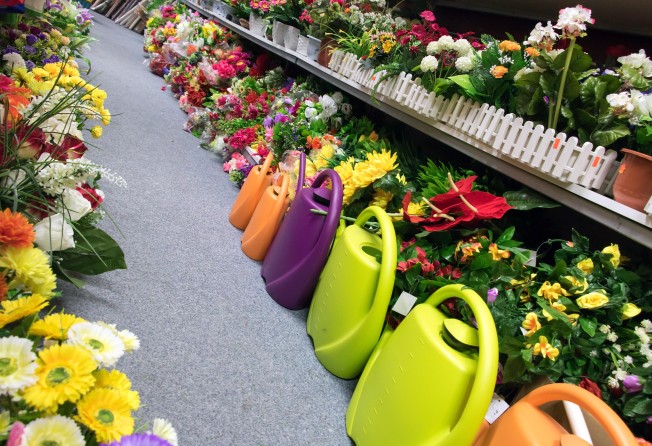Donald Trump’s tariffs could nip South Carolina florist’s business – and his daughter’s Guangdong trip – in the bud
- Smaller US businesses have greatly increased ties with Chinese companies in past two decades
- New tariffs could hit Chinese products ranging from toys to hair brushes

Mike Green, who sells artificial flowers made of fabric and plastic, is one of countless small American business owners caught up in a trade war that threatens not only their livelihoods, but deep friendships and ties built over years with Chinese business partners.
Much of Green’s business at Palmetto Designs International in Spartanburg, South Carolina, depends on China, by far the biggest US source for artificial flowers. Manufacturers in Guangdong province make the polyester and other decorative flowers and greenery arrangements that Palmetto sells to big-box retailers in the US.
But these ties extend beyond money.
Green and his family have become fascinated with all things China. Mooncakes and red packets make their way to the Greens’ postbox each winter and autumn. His eldest daughter plans a double major in Mandarin and chemistry when she starts college this year.
And when each of his five children turn 13, they get a gift of travelling with their father to the Guangdong plants that churn out the flowers that help pay for everything from their trainers to school clothes.
Two of Green’s children have already gone, but the planned summer trip with his daughter who recently turned 13 may be called off – a small but significant human cost of the escalating US-China trade war.
Artificial flowers are on the latest tariff list being considered by the US government, which, if implemented, will slap a 25 per cent fee on the heart of Green’s business.
“[The tariffs] will just decimate us – we’d be close to a break-even company,” said Green, who has four workers in Spartanburg and several Chinese staff members doing quality control in Guangdong.
“I understand there’s national security [concerns] on both sides. But there’s thousands of ‘mes’ out there, and we’re going to get hammered,” he said, referring to the impact of tariffs on US business owners.
Green is among the latest batch of American business owners who find themselves and their livelihoods caught up in an economic tug of war between the world’s two largest economies.

In its latest move, the US announced plans to place tariffs on the remainder of Chinese imports, representing US$300 billion worth of mainly consumer goods, including trainers, hair brushes, toys and smartphones.
They face unpleasant choices – raising prices of their products, accepting lower profit margins, rethinking their supply chain to avoid China, and asking Chinese manufacturers to help absorb the hit through lower prices. Or a mix of all four.
Those choices are testing years-long business relationships and personal ties between US and Chinese companies.
“I’m friends with some of these people (at the largest factory partner) … We’re their biggest customer by far. (The Chinese factory owner) is as worried about it as I am,” said Green, 48, who made his first trip to China in 2001 for a previous artificial flower business, and founded his current company in 2011.
“It’s funny because it’s like we’re on the same team, but our two countries are fighting a trade war …
“We’re just truly caught in the cross hairs of geopolitics and 5G networks and Huawei and Apple and whatever else is driving this stuff,” said Green, who declined to give sales figures on his business.
Import-export relationships between China and United States have accelerated since China joined the World Trade Organisation in 2001.
Ties between US small and medium-sized business owners and Chinese suppliers further expanded with the internet, which simplified finding such manufacturers and suppliers for US businesses, said Doug Barry, spokesman for the US-China Business Council.
“Many US companies of all sizes are working closely with their Chinese suppliers to try to find a way to share the tariff burden, not just contractually but also informally, because they have really important long-term relationships,” said Hong Kong-based Baker McKenzie lawyer Jon Cowley.
“It’s really fascinating to see this level of cross-border collaboration,” Cowley said, noting this can include sharing the burden of the tariffs or creating reimbursement deals based on the cost increase.
Leveraging these long-standing business relationships is not only a potential survival tactic for US companies, but could help keep prices under control for consumers.
“The people that have these relationships work with each other. It’s not a zero-sum view of doing business,” said William Zarit, former minister for commercial affairs at the US embassy in Beijing, noting that both sides can agree to cut down their share of profits to get through this period of the trade war.
“Eventually, if this keeps going, the consumer is going to have to absorb at least part of the tariff, but that’s one way to work together to minimise the damage to the market,” he said.
Green is hoping to be able to reach an agreement to share the burden with his China-based manufacturers if the tariffs go into action, perhaps getting his partners to agree to absorb 5 to 10 per cent of the excess cost.
In the artificial flower decoration industry, which only represents about US$700 million of the more than US$550 billion in Chinese imports that made their way into the US last year, the hit from the tariffs could cause a shakeout, as big retailers look to cut out middlemen like Green.
Switching supply chains, an option for some US companies with more widely produced goods, is not possible for Green. China dominates the world’s artificial flower market, and has special machines needed to make the products.
Of US imports of artificial flowers, the most came from China and Hong Kong, which became the world’s artificial flower hub in the 1950s, during the time Hong Kong tycoon Li Ka-shing founded his first business churning them out.
The making of such flowers moved to mainland China, where output dwarfs the second-largest source of US imports, Thailand, which is responsible for slightly more than US$3 million annually.
With orders coming in for a busy spring season next year, the uncertainty is already making business decisions a challenge for Green. Looking ahead, he tries to figure out how he will make ends meet if the tariffs do go through and he cannot get an exception.
“I’ll take a huge hit, and then the US consumer is going to take a hit,” he said of the tariffs. “Everybody’s going to pay.”